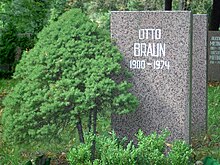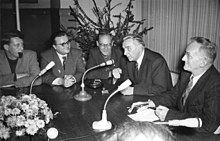Otto Braun (writer)
Otto Braun (born September 28, 1900 in Ismaning ; † August 15, 1974 in Varna ) was a German writer and KPD functionary. As Mao Zedong's military adviser, he took part in the Long March . Its Chinese name is Li De or Li Teh 李德. He was also the first secretary of the GDR Writers' Association .
Life

The son of an accountant and a teacher attended the teacher training college in Pasing from 1913 to 1919 and joined the youth movement during the First World War and the Free Socialist Youth (FSJ) after the end of the war . In 1919 he secretly joined the KPD and worked undercover in its defense and intelligence service until 1926 and from 1921 also undercover as editor of the KPD press. He was involved in the establishment of the Munich Soviet Republic and in 1921 in the central German uprisings .
Otto Braun, who already had a considerable " receding hairline " as a young man and wore eye-catching Harold Lloyd glasses, worked under various aliases such as "Oskar", "Oskar Schumann", "Langner" and "Karl Wagner" worked closely with the secret police services of the “State Commissioner for the Monitoring of Public Order”. Later he founded the "independent" news agency Coruna to camouflage his secret service activities , which supposedly collected news about the communist movement in Germany and abroad for distribution to the press.
In 1921 Braun was significantly involved in the so-called "Freyberg Affair" in Berlin, in which communists disguised as German secret police took secret military papers from a Russian exiled Colonel Freyberg in order to hand them over to the Soviet Union. For the first time, Braun came under serious suspicion of working with the communists, but was able to justify himself and continue to pretend to be right-wing extremist. From 1925 at the latest, he also worked for the Soviet military intelligence service GRU . When Braun in 1926 an emissary of the Communist International (Comintern), the Dane Georg Laursen , stolen or illegally procured documents of the German secret police, etc. a. via activities of the English secret service in the western neighboring states of the Soviet Union, he was finally arrested on September 30, 1926 in Berlin after several days of observation. Otto Braun was then in custody or in custody in Berlin-Moabit from 1926 to 1928 . He was freed on April 11, 1928 in a daring action by an armed group of communists led by his then partner Olga Benario and immediately fled to Moscow .
Braun became a member of the proletarian rifle division in 1928/29 and studied at the military academy "MW Frunze" until 1932 . From 1932 to 1939 he was on behalf of the military intelligence service GRU of the Soviet Union as a military advisor to the Communist International and high officer of the Red Peasant Army in China . Since the Communist International did not agree with Mao Zedong's guerrilla tactics , Otto Braun was to take over the leadership of the army under the Chinese pseudonym "Li De". In 1934 the Red Peasant Army under his leadership suffered such serious losses in open battle that the defense of the main base in Ruijin seemed impossible. Therefore, the Chinese Red Army began the " Long March ", of which Braun was the only foreign participant. Braun was in a relationship with a Chinese woman during this time. Otto Braun, who was intended as the Comintern's “watchdog” for Mao Zedong, was completely played out from 1934 by the much more cunning Mao Zedong, who also succeeded in permanently undermining the trust of his Soviet clients in Otto Braun.
Braun was not subject to any reprisals after his return to Moscow, but despite his military training and experience in the secret service, he was never adequately used again. From 1939 to 1941 he worked as an editor and translator for the publishing house for foreign language literature in Moscow . Until 1946 he was a political instructor in various POW camps and a member of the National Committee for Free Germany . He then lived as a translator and, since 1951, freelance writer in Moscow and Krasnogorsk .
In 1954 he returned to the GDR and became a member of the SED . As a research assistant at the Institute for Marxism-Leninism at the Central Committee of the SED , he was the editor in charge of the German edition of Lenin's works . From 1961 to 1963 he was Erwin Strittmatter's first secretary of the German Writers' Association. In the context of the polemic about the general line from 1959 to 1964, Braun, on behalf of the SED leadership, sharply criticized the policies of the Chinese state and party leadership after the break between the CCP and the CPSU. Braun was also allowed to "expose" Mao Zedong's Chinese notes (1932 –1935) (Berlin 1975) in which he criticized Mao's political stance as well as his personal demeanor and way of life.
Braun was awarded the Patriotic Order of Merit in silver in 1960 and in gold in 1967, the GDR National Prize in 1969 and the Soviet Order of the Patriotic War , the Karl Marx Order and the Lenin Memorial Medal in 1970. His urn was in the grave conditioning Pergolenweg the memorial of the socialists at the Berlin Central Cemetery Friedrichsfelde buried.
Fonts
- In the Munich Free Socialist Youth . Berlin 1959
- Chinese records (1932-1939) . Dietz Verlag, (East) Berlin 1973. (Autobiography of his time in China).
literature
- Frederick S. Litten: Otto Braun's early work in China (1932–1935) . Eastern Europe Institute, Munich 1988.
- Frederick S. Litten: Otto Braun in Germany . In: IWK , vol. 1991, issue 2, pp. 171-182.
- Frederick S. Litten: Otto Braun's Curriculum Vitae - Translation and Commentary . In: Twentieth-Century China , Vol. 2 (1997), No. 1, pp. 31-62.
- Wilfriede Otto , Bernd-Rainer Barth : Brown, Otto . In: Who was who in the GDR? 5th edition. Volume 1. Ch. Links, Berlin 2010, ISBN 978-3-86153-561-4 .
- A. Kolpakidi, D. Prochorov: Imperija GRU - Ocerki istorii rossiskoj voennoj razvedki , Vol. 2, Moscow 2000, ISBN 5-224-00600-7 , p. 320/321 (some information on Otto Braun as an employee of the GRU).
- Barbara Schmitt-Englert: Germans in China 1920–1950: Everyday life and changes . Ostasien Verlag, Großgossen 2012, ISBN 978-3-940527-50-9 . P. 134 f.
- Konrad Faber: Dubious personalities from the field of espionage in Germany (1880-1935) and their motives (19 case studies). In: Jürgen W. Schmidt (ed.): Secret services in Germany: affairs, operations and people (= secret service history, vol. 4). Ludwigsfelde 2013, pp. 264–356, ISBN 978-3-933022-78-3 . (Case study II on pp. 273–280 deals in detail with Otto Braun, using previously unknown material.)
Remarks
- ↑ His article in Neues Deutschland on May 27, 1964 revealed his then Chinese pseudonym Li Teh.
Web links
- Literature by and about Otto Braun in the catalog of the German National Library
- Mao's German helper - Solveig Grothe at einestages.spiegel.de about Otto Braun
| personal data | |
|---|---|
| SURNAME | Braun, Otto |
| ALTERNATIVE NAMES | Li De; Li Teh (as a China politician) |
| BRIEF DESCRIPTION | German writer and KPD functionary |
| DATE OF BIRTH | September 28, 1900 |
| PLACE OF BIRTH | Ismaning |
| DATE OF DEATH | 15th August 1974 |
| Place of death | Varna |
